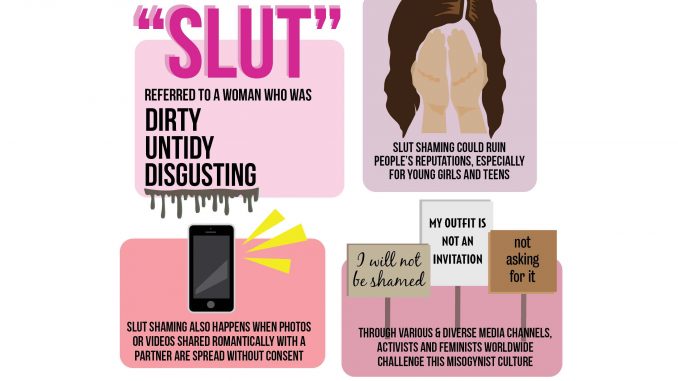
Paige Welch, Editor-in-Chief |
For thousands of years, since the development of patriarchal stereotypes firmly rooted in monotheistic religious beliefs, the bodies of women have become targeted for sexual policing. A narrative has developed over several generations alluding to femininity as the cause of human destruction. According to this narrative, their supposed vulnerability places them closer to a desire to sin.
Eve, the first Christian matriarch, was punished for her sinful act by being cursed with subordination, as well as the inflection of a painful childbirth onto all wombs for the rest of time. This ancient and well-rehearsed creation story can be traced as the foundation for the modern-day subordination of female-bodied people.
Slut shaming is not a new phenomenon with a new name, coined by the digital age. According to the Huffington Post, slut-shaming as it is known today began in the 1920’s with the rise of “flappers,” who were rebellious and fashionable women determined to express themselves. The media began to focus a panicked attention on the expressive women showing more skin, partying with single men, going out without a chaperone, dating freely, and acting in so-called “masculine” ways. Historic media sources found this to be a threat to the way of life, especially to the carefully balanced gender dynamics.
Bustle also points out that slut-shaming can have many meanings, depending on situational context. But, “in its purest form, slut-shaming is an attack on someone’s character and reputation, and one that demonizes female sexual agency. Women across the world are generally taught from birth, implicitly or explicitly, that their sexual behavior defines their worth in the world” (bustle.com).
Social media has allowed for a rapid increase in the amount of images, stereotypes, assumptions, and interactions that can be digested by anyone on a daily basis. With this, many more ways to target feminine bodies have emerged. It is done through the active formation of beauty standards telling women that in order to be beautiful, they must participate in the consumption of countless beauty products so that they can look a certain way. The companies that make these products target every woman differently, from women of color, to trans women, and tweens.
In 2011, the very first SlutWalk was held in Los Angeles, an event to reclaim the word “slut” and its historical use of framing female sexuality in various negative ways. In 2015, celebrity Amber Rose attended the event to bring the specific experiences of women of color to light.
“[There’s] a historical context in which black women have always ‘been understood to be lascivious, hypersexed, and always ready and willing,’ [which] makes it difficult to fully embrace the word.” (huffingtonpost.com).
Much like many other issues within the diverse feminist community, reclaiming the word “slut” has conjured up a mass amount of dialogue concerning the topic. Some believe that the word should be erased completely, since it is oftentimes used in mass media remove women’s power over their own bodies. Others find reclaiming the word a very powerful experience because it prevents others from using the label against them.
In my own experiences, I have never been slut shamed, but I have been called a “prude”. Which, according to the rules of body policing, is what you are if you are not a “slut.” It was not so much hurtful for me as it was confusing. It made me think about my body in a way that would have never occurred to me naturally. I started wondering if my sexual choices would affect the way the whole of society would view me. But I have heard many of my friends in college be slut shamed for the choices they have made about their own bodies.
I have witnessed first hand a friend berated for merely talking to a boy. She was actively isolated from her social group, and made to feel guilty about herself at every opportunity. This was done by people who are all too proud to call themselves feminists. I wondered why the boy did not receive any backlash for his actions. Witnessing the experiences of other women has caused me to draw the conclusion that slut shaming is a phenomenon deeply integrated in society, that even the people who think they are above it find themselves resorting to socially isolateing girls that have done “wrong.”
Regardless of an individual’s stance on the word “slut” itself, the direct consequences of the act of slut shaming are very visible. For example, victim blaming, the act of blaming a sexual assault victim for the crime done against them, is a product of slut-shaming. Instead of viewing the crime as a direct violation of a human being, the public first discredits the morality of the victim by pointing out the clothes they were wearing, if they were drinking, and if they were making themselves vulnerable in any way.
Slut shaming on the surface is just another way to bully young girls, but in the grand scheme of society, it is a product of systemic body policing. Every time a female body is targeted, it is done so in a way that invites criticism of the individual’s social worth.
Leave a Reply